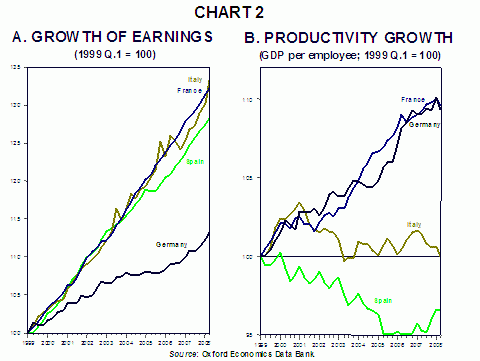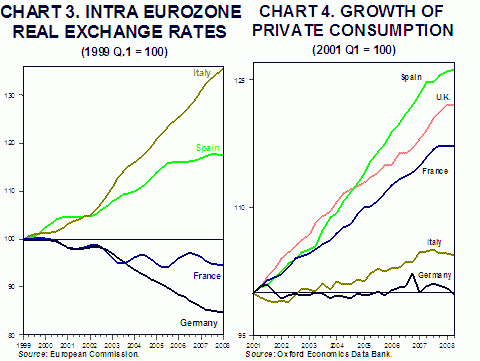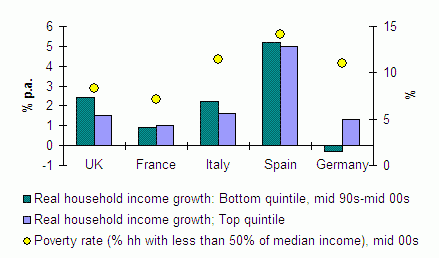The German economy is in better shape than many to weather the financial crisis. Germany has no over-indebted households and no house price bubble. Private and government consumption have been flat for years. Growth has been led by net exports thanks to successful company restructuring, and the non-financial corporate sector is in good shape. While earlier euro appreciation and recent financial turmoil may lead to recession, Germany could ride out the crisis by establishing more balanced growth via real wage increases to encourage long-suppressed private consumption and a significant fiscal policy stimulus.
German strengths and weaknesses
Germany’s recent performance has been impressive – 2006-07 saw nearly 3% growth despite a sharp increase in VAT. This revival was clearly not due to government reforms, as was the case in the UK under Mrs Thatcher, whose sweeping deregulation contributed, if with a long lag, to the remarkable economic performance of the last decade. The limited reforms undertaken by Schroeder in 2004-05 may have had some positive effects, but they were far too recent and small to explain a more than doubling of the growth rate. Nor did Germany experience the alternative model of successful reforms, pioneered by the Netherlands or Ireland, based on a consensus between the social partners, an incomes policy and fiscal restraint.
Yet, far-going reforms lie behind recent German successes. These came neither from above (as in the UK), nor from cooperation between industry, labour, and the government (as in the Dutch and Irish cases). They were the result of corporate action, usually in cooperation with works councils and unions. Over the last decade, German firms have profoundly changed work practices and compensation levels and this, in turn, has greatly boosted exports and growth.
Through the early 1990s, German competitiveness plummeted as labour costs (in dollars) skyrocketed. To redress this, German companies aggressively embraced both globalisation and outsourcing. The first choice is illustrated in Chart 1. While Germany’s foreign trade/GDP share was broadly similar to that of the other major European economies in the early 1990s, it rose much more sharply than elsewhere over the last decade. And a large element of that increase came from trade with Eastern Europe, which provided Germany not only with a buoyant market but also with a source of cheap, well-trained labour. As German companies outsourced or threatened to outsource a large fraction of their manufacturing activities, the domestic labour force made significant concessions in terms of both wages and work practices in order to safeguard jobs. Recent research (Becker and Muendler, 2008) shows that German companies that increased employment in foreign subsidiaries retained more workers at home than similar firms that did not expand abroad.
Interestingly, this was achieved in the absence of virtually any strike activity, thanks, in large part, to the Mitbestimmung or codetermination practices (Carlin and Soskice, 2008). These have been fiercely criticised in much of the Anglo-American literature, as an intolerable intrusion in the freedom which managers should have to cut wages, fire workers (and pay themselves inordinate amounts). Yet, by involving organised labour in strategic decisions, codetermination facilitated an adjustment that would elsewhere almost certainly have been accompanied by a good deal more social strife and redundancies.
The resulting moderation in wages and improvements in productivity have been startling, especially in a comparative European context (Chart 2). As a result, Germany’s competitiveness improved sharply, as shown by Commission estimates of developments in real intra-Eurozone exchange rates (Chart 3). Improved competitiveness is, of course, not the only explanation for the sudden acceleration in German growth, but it is almost certainly the most important one. The reverse side of this coin is, however, the weakness of private consumption. For seven years now, consumer spending has hardly risen, in sharp contrast to developments elsewhere in Europe (Chart 4). A strategy that privileges wage restraint and productivity growth has strengthened profits and, with a lag, investment, but it has so far done very little to boost household income.
Stimulating German consumption
The financial turmoil now threatens to plunge the country into a lengthy recession. The lop-sided nature of recent growth makes Germany vulnerable to a slump in capital goods exports, as global investment falters in response to the dramatic rise in uncertainty (see Nick Bloom’s Vox column). Rapid and decisive policy intervention is needed to raise private consumption. In the US, the UK, and several other OECD countries, such efforts face the headwind of falling house prices and high household debt. This is not the case in Germany: house prices have fallen since 1990, household debt has remained stable, and the saving ratio is high and rising.
How can consumption be encouraged? There are two mechanisms. The first is via stronger growth of real wages. In April, EU finance ministers and ECB president Jean-Claude Trichet approved of the 8% public sector wage deal (spread over two years), arguing that unlike other countries, German real wages required an upward correction (Financial Times, 4 April 2008). For the engineering industry (whose negotiations have just ended), a settlement above inflation would have been welcome. The very moderate agreement reached will make little additional contribution to the growth of consumption.
Second, consumption must be supported by a substantial fiscal stimulus. The design of such a stimulus should reflect longer-term principles via measures that boost demand (especially consumption) in the short run but also contribute to improving the supply side in the longer run. The stimulus should also be directed toward reversing the significant rise in income inequality and poverty in Germany from the mid-1990s. Chart 5 compares the growth of household incomes at the bottom and top of the distribution and poverty rates in Germany and the other large European economies.
Chart 5 Income distribution and poverty
Source: OECD (2008)
The opportunity should be taken to introduce expenditure programmes that will not have to be reversed (either because they improve long-run economic efficiency or because they are self-liquidating) and to introduce changes to the tax system consistent with longer-term objectives. Measures such as temporary tax rebates (‘cheques through the post’) or reductions in VAT rates do not fall under this umbrella. They may well be necessary but, in a climate of great uncertainty, direct tax cuts might be saved, while indirect ones could contribute to price deflation. Hence the need to direct tax cuts or benefit increases to poorer households since these are likely to have the greatest short-run impact on consumption. Time-limited cheques for use on specific items related to other government objectives such as the reduction of CO2 emissions would also fit the criteria.
A number of other specific policies on the expenditure and tax side would more reliably boost demand and contribute to longer-run objectives. Examples include:
Policies to improve incentives for women to participate more fully in the labour market
These will create jobs, raise incomes and boost consumption. Such policies include:
- bringing forward the planned increased provision of pre-school child care (this is much lower in Germany than elsewhere in Europe);
- speeding up the introduction of full-day school (half-day school is still prevalent in much of Germany and restricts women’s hours of work);
- reform the tax treatment of married women to remove the disincentive for second earners to work longer hours.
In the short run, policies to improve the availability of childcare and to provide full-day school will directly raise employment. In the longer run, they will boost women’s labour force participation and working hours, creating a larger tax base. Higher levels of labour market participation by married women will improve the possibilities for self-insurance within the household and reduce the need for increased precautionary savings that have accompanied the labour market reforms introduced in the past few years (Carlin and Soskice, 2008).
Policies to improve training and education
These involve front-loaded additional government expenditure in the short run (thus generating jobs for example, for young university graduates), but do not represent spending programmes that the government would want to reverse. Such policies include:
- targeting German language training and other remedial education for immigrant children, who have been highlighted as a major problem area in the PISA studies.
- targeting additional teaching resources on children from low-education and jobless households.
- increased provision of training for older workers (Germany’s highly successful apprenticeship model should be supplemented with effective retraining for adults).
Policies to bring forward expenditure on self-liquidating investment projects
These, in particular, are projects contributing to longer term environmental goals, from those on a household scale to major infrastructure investments.
There was a structural improvement in Germany’s fiscal position over recent years (producing a cyclically adjusted budget balance in 2007). Consolidation was predominantly expenditure rather than tax-based. Years of spending restraint provide the basis for the implementation of a structurally oriented fiscal stimulus package now. If this is delayed or is too timid, Germany runs the risk of slipping into combined stagnation and deflation. Japan’s lost decade stands as a stark reminder of the dangers of an inadequate response to a potentially severe recession.
References
S.O. Becker and M.-A. Muendler (2008). ‘The Effect of FDI on Job Security’, The B.E. Journal of Economic Analysis and Policy, 8, (Advances), Article 8, 1–44,
W.Carlin and D. Soskice (2008). ‘German economic performance: disentangling the role of supply-side reforms, macroeconomic policy and coordinated economy institutions’, Socio-Economic Review.
OECD (2008). Growing Unequal: Income Distribution and Poverty in OECD Countries, Paris: OECD.






